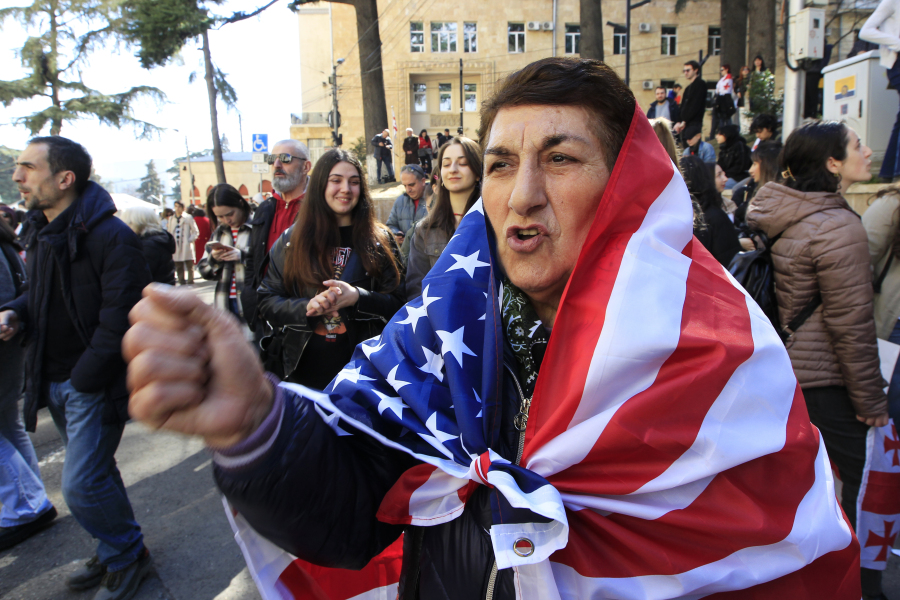TBILISI, Georgia (AP) — Georgia’s parliament voted Friday to drop a foreign agent registration bill after the legislation, which opponents warned could be used to stifle dissent and curtail media freedoms, prompted tens of thousands of protesters to swarm the capital this week.
Lawmakers voted 35-1 against the bill during a session that lasted just four minutes and featured no discussion. The vote came less than a day after Georgia’s ruling party, Georgian Dream, said it would withdraw the legislation.
The proposed law would have required media and nongovernmental organizations that receive more than 20% of their funding from foreign sources to register as “agents of foreign influence.” Critics argued that if enacted, the law could hinder Georgia’s aspirations of one day joining NATO and the European Union.
Protesters in Tbilisi said the bill was inspired by a similar law in Russia that has been used to silence critics. They rallied outside the parliament building despite being met with tear gas and water canons.
The bill’s authors claimed it was modeled on the U.S. Foreign Agents Registration Act of 1938. The U.S. law, enacted 80 years ago to expose Nazi propaganda, requires people to disclose when they lobby in the U.S. on behalf of foreign governments or political entities.
Politicians from Georgian Dream nonetheless began to back away from the bill Wednesday evening, and Thursday’s discussion of the proposal was canceled.
However, the protests continued on Thursday night and Friday morning, with those gathered saying they wanted to ensure the bill was abandoned and to secure the release of more than 100 protesters who were arrested earlier.
The Georgian Interior Ministry reported Friday that it had freed all 133 people who were detained at mass rallies outside parliament on Tuesday and Wednesday. It said alleged “instances of violence” at the demonstrations still were under investigation.
Pro-European Union lawmakers who opposed the bill unfurled national and EU flags during Friday’s vote. Khatia Dekanoidze, a lawmaker from the United National Movement, called the draft legislation a “Russian law” and a “dangerous obstacle” for Georgia’s European integration.
“Today is a very important day,” she told The Associated Press. “We did it together with young protesters, young generations, students, together with Georgian society, and it was absolutely amazing how united society was.”
Mate Gabeshia, a student who took part in a Friday rally against the bill, said “the government understood that they had no chance” given the groundswell of popular protest.
Opposition parties in recent years have accused Georgian Dream of pursuing pro-Russia policies while claiming to be Western-oriented. Opponents charge that the party’s founder, former Prime Minister Bidzina Ivanishvili, a billionaire who amassed his fortune in Russia, calls the shots even though he currently doesn’t hold a government job.
The party has repeatedly denied any links to Russia or that it leans toward Moscow.
Although it agreed to withdraw the bill, Georgian Dream and its allies said the public was misled about the proposal.
“The bill was labeled falsely as a ‘Russian law,’” the party and its parliamentary allies said in a joint statement Thursday.
Georgian Dream’s foreign agents bill did appear similar to one enacted in Russia in 2012, which has been used to shut down or discredit organizations that are critical of the government and President Vladimir Putin.
Russian officials on Friday distanced themselves from Georgia’s legislation. Kremlin spokesman Dmitry Peskov told reporters that Moscow had “nothing to do” with the bill and alleged the U.S. was using the opposition to it to foment anti-Russian sentiment in Georgia.
Speaking on state TV, Russian Foreign Minister Sergey Lavrov compared the rallies this week to the Maidan protests in Ukraine in 2014 that swept a pro-Kremlin president from power. Lavrov claimed the bill was “a pretext to launch an attempt to forcefully change the government” in Tbilisi.
Russia-Georgia relations have been rocky and complicated since the Soviet Union’s collapse. The two countries fought a short war in 2008 that ended with Georgia losing control of two Russia-friendly separatist regions. Tbilisi had severed diplomatic ties with Moscow, and the issue of the regions’ status remains a key irritant, even as relations have somewhat improved.
Giorgi Badridze, a former Georgian ambassador to the U.K. who is now a senior fellow at the Georgian Foundation for Strategic and International Studies, accused the ruling party of using the bill to sabotage Tbilisi’s prospects for EU membership.
Badridze painted the law as part of an effort former Prime Minister Bidzina Ivanishvili and his allies to establish government control over the media and civil society organizations. He called the introduction of the foreign agents bill — and the protests against it — “a moment of truth.”
“This was the moment when Ivanishvili, unintentionally, I guess, reawakened a large part of Georgian society, and most importantly, the students and youth,” he said.
The European Union in June agreed to make Ukraine and Moldova candidates for EU membership, but held back on doing the same for Georgia. EU leaders cited the need for reforms in the Black Sea nation of 3.7 million.



